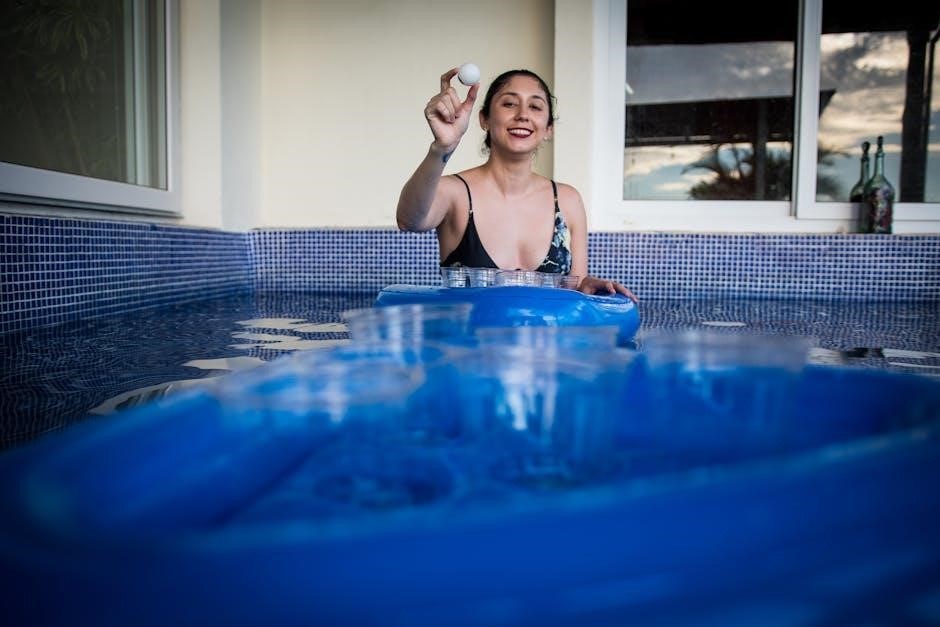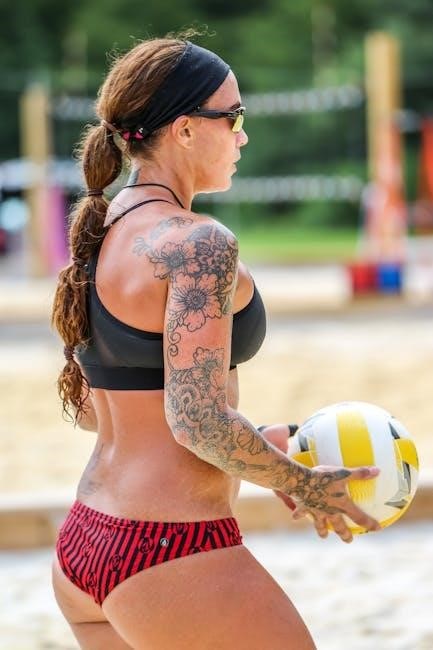A well-structured meal plan is critical for bikini competition prep‚ serving as a roadmap to achieve the desired physique. It ensures a balanced diet‚ supporting muscle tone and energy levels while promoting fat loss. By focusing on nutrient-dense foods and portion control‚ competitors can maintain discipline and stay on track. Each plan is tailored to individual goals‚ metabolism‚ and lifestyle‚ making it essential for success in the competition.
Understanding the Importance of a Structured Diet
A structured diet is the cornerstone of bikini competition preparation‚ ensuring consistency and progress toward physique goals. It provides a clear framework for nutrient intake‚ portion control‚ and meal timing‚ which are vital for fat loss and muscle retention. Without structure‚ it’s easy to overeat or miss essential nutrients‚ leading to plateaus or poor performance. A well-planned diet also supports energy levels for intense training and aids in recovery. Additionally‚ it helps competitors develop discipline and accountability‚ which are crucial for the mental and physical demands of competition. By adhering to a structured plan‚ athletes can achieve the lean‚ toned appearance required for success on stage.
Setting Realistic Goals and Timeline for Competition Prep
Setting realistic goals and timelines is crucial for a successful bikini competition prep. A common mistake is rushing the process‚ as significant physique changes require time. Typically‚ a prep period of 12-24 weeks allows for safe and sustainable fat loss‚ averaging 0.5-1% body fat reduction weekly. Goals should be specific‚ measurable‚ and achievable‚ focusing on aspects like body fat percentage‚ muscle tone‚ and overall health. A well-structured timeline ensures gradual progress‚ preventing burnout and maintaining motivation. It’s important to work with a coach to tailor the plan to individual needs‚ ensuring the timeline aligns with competition dates and personal commitments. This approach maximizes results and supports long-term success.

Key Components of a Bikini Competition Meal Plan
A bikini competition meal plan focuses on protein intake‚ carbohydrate timing‚ and healthy fats to support muscle growth and fat loss. It emphasizes whole‚ nutrient-dense foods and proper hydration.
Macronutrient Breakdown: Protein‚ Carbs‚ and Fats
Protein is essential for muscle preservation and recovery‚ typically comprising 1.6-2.2 grams per kilogram of body weight. Carbohydrates fuel workouts and support fat loss‚ with intake varying based on the competition phase. Healthy fats‚ such as avocados and nuts‚ are vital for hormone regulation and satiety. The balance of these macronutrients ensures sustained energy‚ lean muscle retention‚ and optimal body composition. Adjustments are made to align with specific goals‚ like cutting or maintaining‚ ensuring a personalized approach for each competitor. Proper tracking and timing are crucial for achieving the desired aesthetic and performance during the competition.

Meal Frequency and Portion Control
Meal frequency and portion control are critical components of a bikini competition meal plan. Typically‚ 5-6 smaller meals are consumed throughout the day to maintain metabolism and prevent excessive hunger. Portion sizes are carefully measured to ensure calorie intake aligns with goals‚ whether cutting or maintaining. This structured approach prevents overeating and promotes consistent energy levels. By adhering to a set schedule‚ competitors maintain discipline and avoid metabolic slowdowns. Adjustments are made based on progress‚ ensuring the plan remains effective and sustainable. Proper portion control also supports macronutrient balance‚ aiding in fat loss while preserving lean muscle mass.
Food Quality: Focus on Whole‚ Nutrient-Dense Foods
Emphasizing whole‚ nutrient-dense foods is a cornerstone of a successful bikini competition meal plan. These foods provide essential vitamins‚ minerals‚ and fiber while supporting fat loss and muscle maintenance. Lean proteins like chicken‚ fish‚ and eggs are prioritized‚ along with complex carbohydrates such as brown rice‚ oats‚ and vegetables. Healthy fats from sources like avocados and nuts are also included to support hormone function and satiety. Avoiding processed and high-sugar foods ensures a cleaner diet‚ reducing inflammation and promoting a leaner physique. By focusing on quality‚ competitors can optimize their body composition and overall health‚ making whole foods the foundation of their prep journey.

Hydration and Supplementation
Proper hydration is crucial for fat loss and muscle recovery‚ while supplementation supports nutrient gaps and performance. Prioritize water intake and consider essential supplements like whey protein and omega-3s.

The Role of Water in Body Composition
Water plays a pivotal role in body composition‚ aiding in fat loss and muscle recovery. Proper hydration boosts metabolism‚ enhances digestion‚ and maintains muscle tone‚ which is essential for a lean physique. Even mild dehydration can hinder performance and slow down progress‚ making it crucial for competitors to drink plenty of water daily. Staying hydrated also helps reduce water retention‚ providing a more defined appearance on stage. Aim to consume at least 2-3 liters of water per day‚ adjusting for activity levels and sweat loss. Prioritizing hydration ensures optimal bodily functions and supports the overall success of a bikini competition meal plan.
Essential Supplements for Competition Prep
Supplements play a key role in enhancing performance and recovery during bikini competition prep. Whey protein supports muscle growth and repair‚ while creatine boosts strength and endurance. BCAAs help reduce muscle soreness and prevent breakdown during intense workouts. Omega-3 fatty acids aid in reducing inflammation and improving overall health. A multivitamin ensures essential nutrients are met‚ especially during caloric restriction. Additionally‚ probiotics support gut health‚ which is vital for nutrient absorption. Always consult a nutritionist or trainer to tailor supplements to your specific needs and avoid over-supplementation. These additions‚ combined with a structured meal plan‚ help competitors achieve their goals safely and effectively.

Sample Meal Plan Ideas
- Breakfast: Egg whites with spinach and whole-grain toast
- Lunch: Grilled chicken salad with quinoa and mixed veggies
- Dinner: Baked salmon with sweet potato and green beans
- Snacks: Greek yogurt with berries or a protein bar
These meals provide balanced nutrition‚ supporting muscle maintenance and fat loss.
Breakfast Options: High-Protein Recipes
Starting your day with a high-protein breakfast is essential for maintaining muscle and boosting metabolism. Try egg whites with spinach and whole-grain toast for a lean‚ nutrient-packed start. Another option is Greek yogurt with fresh berries and chia seeds‚ offering a mix of protein and fiber. For a post-workout meal‚ protein pancakes made with whey protein and oats are a delicious choice. Additionally‚ smoked salmon on a bagel with avocado provides healthy fats and protein. These recipes are tailored to support fat loss while keeping you full and energized throughout the morning.
Lunch and Dinner: Balanced Meals for Sustenance
For lunch and dinner‚ focus on balanced meals that provide sustained energy and support muscle maintenance. Include a mix of lean proteins like grilled chicken‚ turkey‚ or fish‚ paired with complex carbs such as quinoa‚ brown rice‚ or sweet potatoes. Add a variety of colorful vegetables like broccoli‚ spinach‚ or asparagus to ensure a broad spectrum of nutrients. Healthy fats from avocado‚ olive oil‚ or nuts can enhance meal satisfaction. Examples include grilled chicken breast with quinoa and steamed vegetables or baked salmon with sweet potato and green beans. For vegetarians‚ tofu or legumes are excellent protein sources. These meals keep you fueled and aligned with your competition goals.

Snacks: Healthy Choices to Keep You on Track
Snacks are essential for maintaining energy levels and preventing hunger between meals. Opt for nutrient-dense options like Greek yogurt with berries‚ hard-boiled eggs‚ or veggies with hummus. Protein-rich snacks such as chicken or turkey slices or protein smoothies help preserve muscle mass; For vegetarians‚ apple slices with almond butter or rice cakes with vegan protein powder are great choices. Avoid sugary or processed foods‚ as they can hinder progress. Portion control is key to staying on track without overeating. These snacks provide sustained energy‚ support recovery‚ and keep you focused on your competition goals. Incorporate variety to avoid boredom and ensure a well-rounded intake of nutrients throughout the day.

Common Mistakes to Avoid
Over-restricting calories can lead to nutrient deficiencies‚ while neglecting meal prep often results in poor food choices. Avoid these pitfalls to maintain consistency and achieve goals effectively.
Over-restricting Calories and Nutrients

Over-restricting calories and nutrients is a common mistake in bikini competition prep that can hinder progress. Severe calorie deficits may lead to muscle loss‚ fatigue‚ and decreased metabolism. It can also cause nutrient deficiencies‚ affecting overall health and performance. Competitors often cut calories too aggressively‚ believing it accelerates fat loss‚ but this approach is counterproductive. Instead‚ a balanced and sustainable calorie intake is essential to maintain muscle mass and energy levels. A well-structured meal plan ensures adequate nutrition while promoting fat loss. It’s crucial to avoid extreme restrictions and focus on nutrient-dense foods to support both physical and mental well-being during competition preparation.
Neglecting Meal Prep and Planning
Neglecting meal prep and planning is a significant mistake in bikini competition preparation. Without a structured plan‚ competitors often resort to last-minute‚ unhealthy choices‚ derailing their progress. Meal prep ensures consistency‚ helping to maintain a balanced diet and avoid nutrient deficiencies. It also saves time and reduces stress‚ allowing focus on training and recovery. A well-prepared meal plan keeps competitors accountable‚ ensuring they meet their macronutrient goals and stay on track. Neglecting this step can lead to inconsistent nutrition‚ hindering fat loss and muscle maintenance. Proper planning is essential for achieving and sustaining the desired physique for competition.



